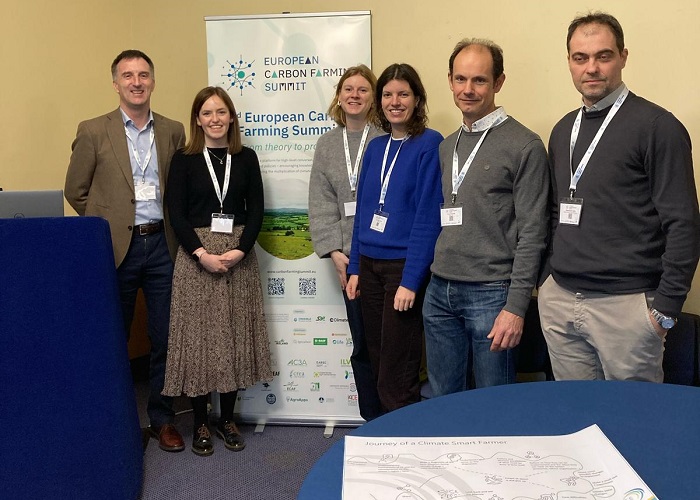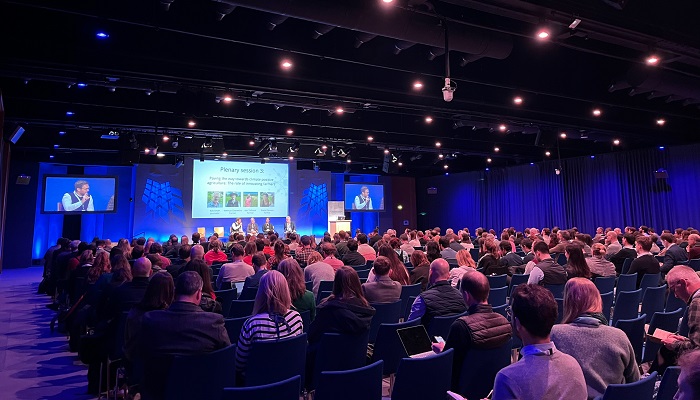07 March 2025
Agriculture – a powerful tool for carbon sequestration and emissions reduction?
Carolanne O’Brien, Project Advisor on the ClimateSmartAdvisors Project reports from this week’s Carbon Farming Summit in Dublin, where agriculture’s role in becoming a powerful tool for carbon sequestration and emissions reduction was explored.
From March 4th to 6th, 2025, over 500 people from across Europe gathered in sunny Dublin for the Carbon Farming Summit, where we explored how agriculture could become a powerful tool for carbon sequestration and emissions reduction.
As expected, there was a strong focus on policy and advancements in technology. However, beyond this, a human element was scattered throughout the event with European farmers sharing their experiences in adopting more sustainable practices, highlighting both their successes and challenges along the way.

Pictured at the Carbon Farming Summit in Dublin are: Tom O’Dwyer and Carolanne O’Brien, Teagasc; Ella Deroo, ILVO; Laurene Lebelt, Climate KIC; Luis Orcaray, INTIA; and Alessandro Zatta, Italian Advisor.
Our focus, however, was on the role of agricultural advisors in this transition.
As part of the ClimateSmartAdvisors EU Project of which Teagasc is a key partner, it was our job to discuss the critical role of advisors in supporting farmers to adopt climate-smart practices, specifically carbon farming.
Collaborating with colleagues from Spain, Belgium, France, Portugal and Italy, our session highlighted four key areas for effective advisory including: understanding farmer motivations for climate action; strengthening advisors’ roles in climate action; exploring decision-support tools; and emphasising reward mechanisms and incentives for farmers adopting climate-smart practices.
With such heavy topics covered over the summit, I couldn’t help but take a slightly unconventional approach in my opening presentation.
So, let me pose to you the same question I asked our audience:
Imagine you are running a race. With pure grit and determination, you have just passed the person in second. What position are you in now?
You have ten seconds.
Now, I won’t reveal to you the correct answer – because that’s not the point. What matters is how you arrived at your answer.
If you responded quickly, you likely relied on fast, intuitive thinking. But, if you paused to analyse your answer, you’ve used slower, more deliberate thinking. Obvious I know.
However, this added contemplation is the same kind of careful decision-making that farmers go through when considering climate-smart practices like carbon farming, where, more often than not, there are more questions than answers.
The role of advisors
That’s where advisors come in.
Understanding what motivates farmers, whether it is profitability, available schemes and supports, a passion for their land, or ensuring its resilience through climate change and future succession, advisors can better address farmers concerns and guide them toward climate smart practices, like carbon farming.

However, after three days of discussions at the summit, it is clear that carbon farming remains in its early stages, and structures like carbon credit trading are more of a future ambition than a present reality.
To make carbon farming more accessible for farmers we highlighted that advisors need greater support and training, particularly in areas surrounding relevant regulations and policy, user-friendly decision support tools like AgNav, and a clear understanding of the rewards available for implementing carbon-farming practices.
There was exceptional audience engagement on this topic and discussions emphasised the importance of showcasing practical benefits, providing relatable examples of climate smart practices, offering consistent, context-specific advice, and supporting peer exchange, financial incentives, and future proofing. These elements reinforce the importance of trust and collaboration between advisors and farmers at every stage.
There is no doubt that the transition carbon farming is complex but one thing is for certain, advisors will play a key role in making it a reality.
